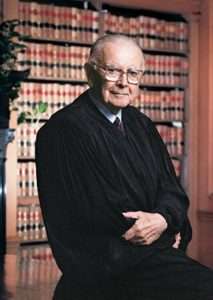The Volokh Conspiracy
Mostly law professors | Sometimes contrarian | Often libertarian | Always independent
Today in Supreme Court History: July 20, 1990
7/20/1990: Justice William Brennan resigns.

Editor's Note: We invite comments and request that they be civil and on-topic. We do not moderate or assume any responsibility for comments, which are owned by the readers who post them. Comments do not represent the views of Reason.com or Reason Foundation. We reserve the right to delete any comment for any reason at any time. Comments may only be edited within 5 minutes of posting. Report abuses.
Please to post comments


Califano v. McRae, 434 U.S. 1301 (decided July 20, 1977): Marshall turns down request to stay the Court’s previous order allowing the Medicaid abortion ban to go into effect; movants were essentially asking a rehearing of two recent Court decisions allowing states to have their own bans on public funding for abortions, and Marshall dissented in those cases
Hedrick v. Kelly, 548 U.S. 928 (decided July 20, 2006): Denying stay of execution (Stevens and Ginsburg would grant the stay); Fourth Circuit had rejected ineffective assistance of counsel claim, and on procedural grounds rejected Brady claim (failure of prosecutor to turn over exculpatory material) and Atkins claim (executing “mentally retarded” is “cruel and unusual”), and substantive claim that he was “mentally retarded”. Hedrick, after an evening of smoking crack and drinking, had kidnapped 23-year-old Lisa Crider, whom he knew to be a crack dealer’s girlfriend and was probably carrying crack, robbed her and raped her, and then shot her in the face to avoid retaliation from the boyfriend. Hedrick was executed the same day the stay was denied.
Justice Brennan’s last opinion for the Court was Metro Broadcasting v. FCC, Justice White giving him a majority to uphold a minority preference policy. His last join might have been Vickers v. Arizona, where he joined Marshall’s dissent in a death penalty case.
Marshall passionately dissented in the abortion funding ban cases. John Hart Ely Jr., famous for his [IMHO not impressive] article against Roe v. Wade — he later supported Planned Parenthood v. Casey on precedential grounds — also strongly opposed the ruling. He argued it was a violation of equal protection.
Thanks!
(“Roe is not Constitutional law and gives almost no sense of an obligation to try to be.”)
But it's precedent so what can you do?
"It is a maxim among these lawyers that whatever has been done before, may legally be done again: and therefore they take special care to record all the decisions formerly made against common justice, and the general reason of mankind. These, under the name of precedents, they produce as authorities to justify the most iniquitous opinions; and the judges never fail of directing accordingly."
https://www.online-literature.com/swift/gulliver/32/
“It is revolting that there be no better reason than that such was done in the time of Henry IV.”
Lawyers know that the law changes over time, old rules altered as times change, sometimes totally being replaced. The test is what the right way to go about this might be in a given case.
Gulliver wrote satire which can exaggerate.
The outcome of Trump v. US will be, and has been, debated until the next time such events occur to re-examine it. In light of past outcomes concerning instability of the nation brought about by certain events, this one follows suit somewhat. Stability is necessary. Instability is not. As in Trump, stability was granted when instability was demanded.
The Citizens tried Trump in Congress and failed to convict.
For this latest, which was forced on the court, not by Trump, but by those who applied, by poor reason, ill-suited statutes fueled by extreme bias of an illegal prosecutor directed by a political adversary, and had no business being brought against Trump, and thus Trump v. US was held.
Demanding instability can not be reasoned at any time, when stability can achieve the desired result. Such a result is called, sometimes, an election. Without stable elections, a return to conflict is wanted, which is destabilizing, and in more ways than ever expected or desired. Unstable elections created this current conflict. Instability has been shown, as in Arizona in 2022 and by myself in Nevada where 1/4 or more election stations were inoperative.